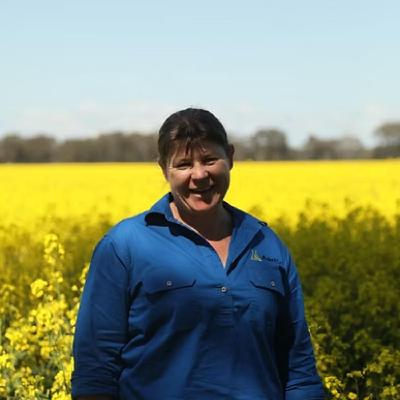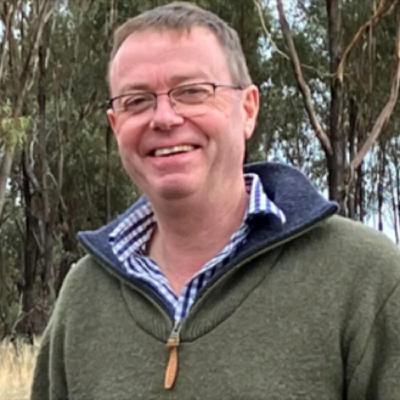Discover The Digging Deeper Podcast
The Digging Deeper Podcast

The Digging Deeper Podcast
Author: North Central Catchment Management Authority
Subscribed: 3Played: 24Subscribe
Share
© 2024 - North Central Catchment Management Authority
Description
Season Two of The Digging Deeper podcast is part of the Victorian Carbon Farming Outreach Program.
The Victorian Carbon Farming Outreach Program is delivered with funding support from the Commonwealth of Australia through the Department of Climate Change, Energy, the Environment and Water under the National Carbon Farming Outreach Program.
8 Episodes
Reverse
Cam is an agronomist and has been consulting to the ag industry for 40 years and is a director of consulting business Nicon Rural Services.
Cam and his wife Fiona Conroy also run a self-replacing, commercial performance recorded Angus herd and a superfine wool Merino flock with a focus on productivity, animal welfare and environmental management on the Bellarine Peninsula.
Cam and Fiona have had a long interest in improving, measuring and understanding the benefits from managing the natural resources on their farm. The main focus has been on soil, water, vegetation and fauna.
More recently they have been interested in understanding the opportunities and future market challenges around carbon accounting and reporting
Season Two of The Digging Deeper podcast is part of the Victorian Carbon Farming Outreach Program.
The Victorian Carbon Farming Outreach Program is delivered with funding support from the Commonwealth of Australia through the Department of Climate Change, Energy, the Environment and Water under the National Carbon Farming Outreach Program.
The world of carbon and emissions can be highly confusing with mixed and conflicting messaging. Dr Schefe will cut through the noise to present a common sense, science-based discussion of the what, how, and why-should-I-care of carbon, emissions and credits.
Season Two of The Digging Deeper podcast is part of the Victorian Carbon Farming Outreach Program.
The Victorian Carbon Farming Outreach Program is delivered with funding support from the Commonwealth of Australia through the Department of Climate Change, Energy, the Environment and Water under the National Carbon Farming Outreach Program.
Hamish Toll and his family manage Circle T; a 4th generation farming property located adjacent to the Gunbower Island State Forest.
The Toll family’s focus is on sustainability and regenerative principles including soil health. A large amount of planning and effort has been invested in native biodiversity plantations, regenerative pastures & sheep breeding to create a landscape that both builds the natural environment base and provides a profitable sheep enterprise.
In this episode, Neil chats with Ryan Garrett from Castlemaine, Victoria.
Ryan Garratt is employed in a combined role as Education Lead for The Diggers Club and as Garden Curator at Buda, Historic House and Garden, in Castlemaine.
Ryan has a wealth of horticultural knowledge combining 25 years of nursery and garden industry experience, including roles as Retail manager, Nursery Production Manager, Garden curator and Garden Educator. Growing up in Castlemaine, Ryan has a deep understanding of the ecology of Castlemaine, its plants, soils, and growing conditions.
Adam Campbell with his family operates Springlake Farming; a 3350ha broadacre farming enterprise at Corack , north of Donald. There are 2 distinct soil types on the farm: heavy self-mulching grey clay found commonly in the Wimmera district and a more Mallee-type soil comprising red clay and red sandy loam. Both require different management approaches.
With a priority on soil health, Adam undertakes minimum tillage practices including direct drilling, stubble retention and inter-row cropping. Hay production is also included in paddock rotations to manage chemical resistance, build nitrogen, and carbon levels in the soil.
Adam implements effective management strategies by utilizing sheep grazing, off-farm employees (contractors and Overseas students) and marketing options for grain and hay to run a profitable farming business.
In this episode, Neil chats to Bill Twigg from Bears Lagoon in Victoria.
Bill and Gwen Twigg have farmed at Bears Lagoon, 60km north of Bendigo on the Loddon Plains, for over 6o years running 5000 first cross ewes and producing prime lambs. With a lifetime of observation and learning, Bill has developed a “natural farming system” using dry land lucerne to mimic the deep rooted native plant species. He has also planted thousands of trees, created a large wetland and revegetated the Loddon River. He believes that if you look after the land, it looks after you. “Look at nature – nature always has the answers”
Website: www.nccma.vic.gov.au/projects/agriculture
Improving soil health is so important because soil health is what leads to healthier food, and we are what we eat”
3rd generation farmer Kelvin Free with his wife Deanne and son Nathan run and manage Mallee Organic Farms in the Tresco area which comprises 160ha of stone fruit and vegetable production and irrigated lucerne. With an increasing demand for organic produce, the Free family converted to certified organic in 2010. Since then, the family have built full control of their produce from production, marketing and then selling, with their produce found in Coles, and Woolworths.
Through hard-earned experience Kelvin has seen the huge benefits of increasing soil health; and believes that their farm-produced compost is an integral part of this improvement.
In this episode, Neil chats to Marlies Eicher from Boort in Victoria.
Marlies, with her husband Peter, both engineers, own and run the award-winning Salute Oliva; a certified organic olive grove in Boort. The journey started in 1998 with the purchase of irrigated grazing land and, over a 5 year period, 2100 olive trees were planted on 8ha. All production, selling and distribution of the olive oil, table olives and soap is done by the Eichers. They have focused on regenerative farming practices and a closed nutrient cycle to improve soil health and have seen significant positive changes in the soil structure and biological activity.
Website: www.nccma.vic.gov.au/projects/agriculture







